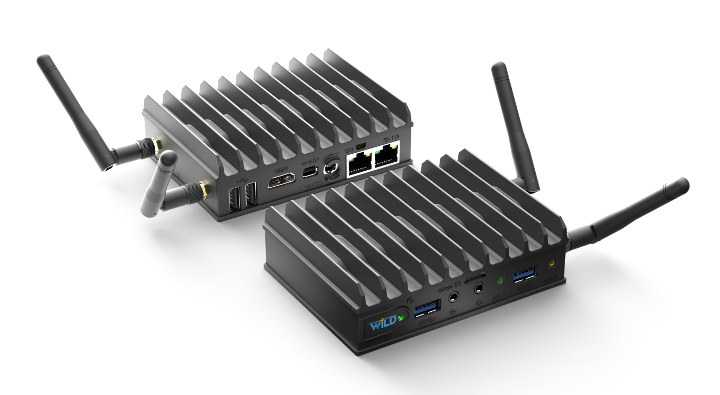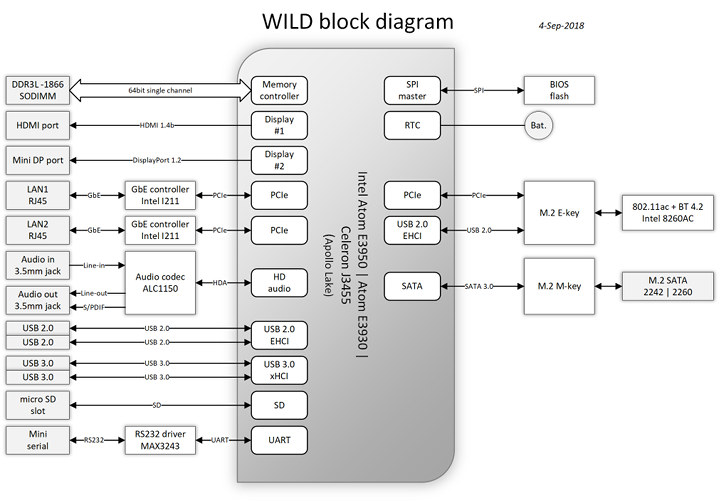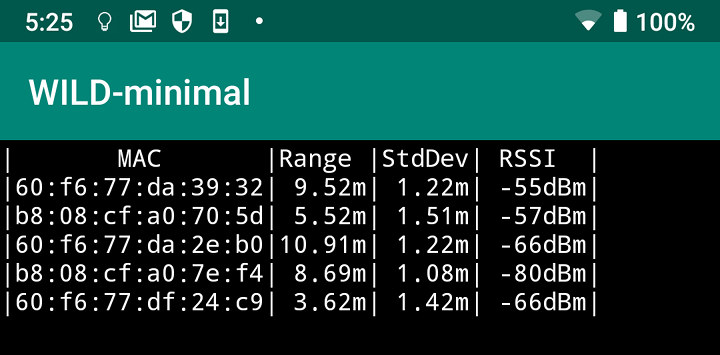When Google released the first Android P preview back in March, one interesting new feature was indoor positioning through 802.11mc WiFi aka. WiFi RTT (Round Trip-Time). That looks promising so I started to look for 802.11mc capable routers, and all I could find were some Intel cards and Marvell chips with WiFi RTT, but not actual products.
Since then Android 9 has been formally released, and today I’ve learned that Compulab launched a WiFi RTT capable router that will work with Android 9.0 phones. Meet Compulab WILD.

Compulab WILD WiFi RTT router specifications:
- SoC (from a choice among three)
- Intel Atom x7-E3950 quad core processor @ 1.6 / 2.0 GHz with 18 EU HD graphics; 12W TDP
- Intel Atom x5-E3930 dual core processor @ 1.3 / 1.8 GHz with 12 EU HD graphics; 6.5W TDP
- Intel Celeron J3455 quad core processor @ 1.5 / 2.2 GHz with 12 EU HD graphics; 10W TDP
- System Memory – 1x SO-DIMM 204-pin DDR3L Non-ECC DDR3L-1866 (1.35V) up to 16GB
- Storage – M.2 M-key 2260 (SATA3 6 Gbps), eMMC (on a module), r 2.5” SATA3 HDD / SSD, and micro SD slot
- Display – mini DP 1.2 up to 4K @ 60 Hz; HDMI 1.4 up to 4K @ 30 Hz
- Audio – Stereo line-out, stereo line-in / mic, HDMI & DP audio
- Network Connectivity
- 2x Gbit Ethernet ports (via Intel I211)
- Intel 8260AC card with WiFi 802.11ac / 802.11mc FTM, and Bluetooth 4.2 + two antennas
- USB – 2x USB 3.0 ports, 2x USB 2.0 ports
- Serial – RS232 port (via micro USB port)
- Extensions – Function and Connectivity Extension T-Card (FACET Card) for PoE, 4G modem, 2nd WiFi module, CANbus + RS485 + GPIO, or GbE optical LAN (SFP)
- Power Supply – 7V-20 V DC (9V- 36V DC optional); 5W to 15W consumption
- Dimensions – 112 mm x 84 mm x 25 mm (metal housing)
- Weight – 350 grams
- Temperature Range – Up to -40°C to 85°C
- Relative humidity – 5% – 95% non-condensing
- Shock, vibration, and dust resistance
If you’ve been following news about Compulab’s mini PCs, you may find the device photos and specifications familiar. That’s because the Compulab WILD is based on Fitlet2 with low power housing, and an extra Intel wireless card plus two external antennas.

So if you already own a fitlet2 or Mintbox2, you could probably reproduce the design by simply adding Intel AC8260 M.2 card, and some modification to the side of the case for the antennas. Bear in mind that the WiFi card was released in 2015, so some firmware update may be needed for 802.11mc to work, although WiFi RTT/802.11mc has been supported since 2015 in the Linux kernel. The company provides GNU/Linux Debian with KDE and standard package management for WILD router, as well as utilities for remote management of WILD access-points. WILD drivers and utilities are said to be open-source. You’ll find more details about software support in the Wiki. The source code for the Android app demo (WILD-minimal) is on Github.
Wi-Fi RTT allows for an accuracy of 1-2 meters for Android 9.0 smartphones, but you could use WILD IoT, the exact same hardware as WILD, but configured as “client” for under 0.5m accuracy, for example for tracking robots, or indoor vehicles. For reference, in the case of WiFi RTT, a client is called an initiator (FTMC), while the server/gateway is a responder (FTMR).
Compulab WILD is sold now starting at $175 for a barebone unit ordered in volume, but the company also offers a model with Celeron J3455, 4GB RAM, and 16GB eMMC for $238. The company recommends five or more units for evaluation an development, and also offers an indoor positioning kit for $1,300 with five devices including four responders and one initiator. More details can be found in the product page.

Jean-Luc started CNX Software in 2010 as a part-time endeavor, before quitting his job as a software engineering manager, and starting to write daily news, and reviews full time later in 2011.
Support CNX Software! Donate via cryptocurrencies, become a Patron on Patreon, or purchase goods on Amazon or Aliexpress






Unfortunately BSD can not handle ac/mc… so pfsense is out.. wrt would be ok i guess, altought there is definetely no profile for this this hw for x86 compiling
It is probably just a matter of time before BSD can handle mc (I would expect BSD to be able to do ac).
Some info about the number of responders needed and their placement, among other details.
http://people.csail.mit.edu/bkph/ftmrtt
I want to purchase four
are they available in Egypt?
if not, how can I get them.